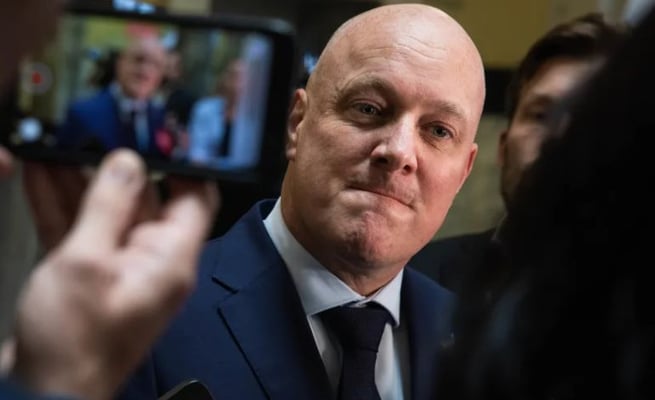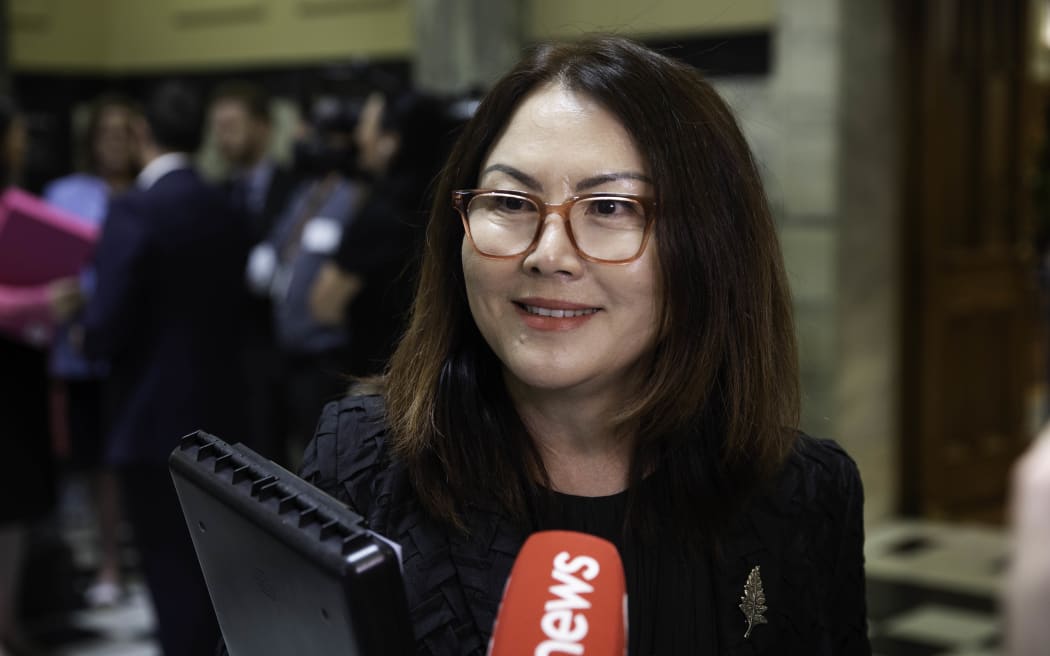Government Intervention To Save Newshub 'Highly Unlikely'

Prime Minister Christopher Luxon said the Newshub shutdown is shocking and saddening, but the media industry needs to innovate.
"I mean, you've got to continue to innovate like every other business does to try and find innovative business models to make businesses like that stack up. But the reality is we are seeing that, we have seen what was traditional press outlets now doing video, we've seen a multimedia approach to it.
"I mean the reality is that consumers are choosing their news and their media through lots of different channels and lots of different multimedia outlets. We have a plurality of media voices in New Zealand, that will continue, but I just want to acknowledge - pretty tough day."
The closure will leave state-owned TVNZ with the only newsroom broadcasting on free-to-air television.
Asked what role politicians undermining trust in the media has played in the decline of the industry, Luxon put the onus back on the media industry.
"If there's a trust challenge with the New Zealand public from media outlets, that's a collective decision that they need to make - to ask questions about why aren't they connecting, why aren't they actually being able to build sustainable business models. There are outlets that are actually working really hard at that and have got different approaches to it, different business models."
Deputy Prime Minister Winston Peters' most recent post on social media site X (formerly Twitter) was a criticism of the media, quoting former Newshub head Mark Jennings.
Luxon said it is "highly unlikely" there would be any government intervention in the sector.
"Massive change in consumer habits about in how media is being consumed and how news is being undertaken and yet at the same hand you've seen a loss of traditional advertising revenue in the sector as well, and so that requires massive innovation for businesses, media businesses, to reinvent themselves, to innovate, to actually find different ways to be able to get their business models in place. So it's unlikely.
"Media players in the marketplace are completely free to innovate as they wish to make sure that they can build a sustainable business model that works for the customers that they serve…. there are some media outlets that are doing that and are working incredibly well."
He acknowledged that "we need a well functioning media environment here in New Zealand", but says "we have a range of media voices and a plurality of voices... in a multimedia, omni-channel kind of way, and that will continue to develop".
"My conversations with Warner Brothers Discovery today, a $20 billion media global company that couldn't find an operational model to make it work for them, says to me that any government intervention they had in that case would not have changed the decision."
Challenged again over the matter, specifically over the approach taken by Deputy Prime Minister Winston Peters, Luxon said: "No politician will appreciate the media coverage that they get, or the media's appreciation or assessment of them - I get that. But the media play an important role in our democracy, it's something that should be incredibly well valued.
"In the case of the deputy prime minister and many other politicians around this place, they all have public and private views of what the media are... he's completely allowed to express his opinion, he's got long-held views that are well understood and well known."
Broadcasting, Communications and Digital Media Minister Melissa Lee says she has no concerns about a lack of plurality in the media.
Owner Warner Brothers Discovery has proposed shutting the news outlet - which began in 1989 as 3 National News - by the end of June, potentially axing hundreds of jobs in the process.
"I think journalists actually losing jobs - as a former journalist - I actually feel for them, I just think it's a sad day," Lee told reporters as she was heading into the debating chamber on Monday afternoon.
"Having said that, plurality is not an issue, because the way that people consume media has actually changed. We're no longer sitting in front of a television box watching the news at six o'clock. People are consuming media more on their mobile phones, on their iPads, on digital platforms as well as on their computers, and I think media have actually changed the way they have produced news as well, it is no longer just broadcast."

Melissa Lee Photo: RNZ / Angus Dreaver
In addition to its 6pm broadcast, Newshub also produced a number of current affairs shows and ran a digital news operation, creating original content in addition to hosting material produced for TV. It also used to run a radio news division.
Lee said she spoke to Newshub boss Glen Kyne about the cuts on Tuesday night. He told her nothing could have helped prevent it, including a faster resolution around the Fair Digital News Bargaining Bill.
"He basically told me about the announcement he was actually making today... he said there was nothing that could have actually helped, it was actually a failure in terms of the way they're advertising for their news, it was actually a massive drop and nothing could have actually helped."
Prime Minister Christopher Luxon said the Newshub shutdown is shocking and saddening, but the media industry needs to innovate.
"I mean, you've got to continue to innovate like every other business does to try and find innovative business models to make businesses like that stack up. But the...
Prime Minister Christopher Luxon said the Newshub shutdown is shocking and saddening, but the media industry needs to innovate.
"I mean, you've got to continue to innovate like every other business does to try and find innovative business models to make businesses like that stack up. But the reality is we are seeing that, we have seen what was traditional press outlets now doing video, we've seen a multimedia approach to it.
"I mean the reality is that consumers are choosing their news and their media through lots of different channels and lots of different multimedia outlets. We have a plurality of media voices in New Zealand, that will continue, but I just want to acknowledge - pretty tough day."
The closure will leave state-owned TVNZ with the only newsroom broadcasting on free-to-air television.
Asked what role politicians undermining trust in the media has played in the decline of the industry, Luxon put the onus back on the media industry.
"If there's a trust challenge with the New Zealand public from media outlets, that's a collective decision that they need to make - to ask questions about why aren't they connecting, why aren't they actually being able to build sustainable business models. There are outlets that are actually working really hard at that and have got different approaches to it, different business models."
Deputy Prime Minister Winston Peters' most recent post on social media site X (formerly Twitter) was a criticism of the media, quoting former Newshub head Mark Jennings.
Luxon said it is "highly unlikely" there would be any government intervention in the sector.
"Massive change in consumer habits about in how media is being consumed and how news is being undertaken and yet at the same hand you've seen a loss of traditional advertising revenue in the sector as well, and so that requires massive innovation for businesses, media businesses, to reinvent themselves, to innovate, to actually find different ways to be able to get their business models in place. So it's unlikely.
"Media players in the marketplace are completely free to innovate as they wish to make sure that they can build a sustainable business model that works for the customers that they serve…. there are some media outlets that are doing that and are working incredibly well."
He acknowledged that "we need a well functioning media environment here in New Zealand", but says "we have a range of media voices and a plurality of voices... in a multimedia, omni-channel kind of way, and that will continue to develop".
"My conversations with Warner Brothers Discovery today, a $20 billion media global company that couldn't find an operational model to make it work for them, says to me that any government intervention they had in that case would not have changed the decision."
Challenged again over the matter, specifically over the approach taken by Deputy Prime Minister Winston Peters, Luxon said: "No politician will appreciate the media coverage that they get, or the media's appreciation or assessment of them - I get that. But the media play an important role in our democracy, it's something that should be incredibly well valued.
"In the case of the deputy prime minister and many other politicians around this place, they all have public and private views of what the media are... he's completely allowed to express his opinion, he's got long-held views that are well understood and well known."
Broadcasting, Communications and Digital Media Minister Melissa Lee says she has no concerns about a lack of plurality in the media.
Owner Warner Brothers Discovery has proposed shutting the news outlet - which began in 1989 as 3 National News - by the end of June, potentially axing hundreds of jobs in the process.
"I think journalists actually losing jobs - as a former journalist - I actually feel for them, I just think it's a sad day," Lee told reporters as she was heading into the debating chamber on Monday afternoon.
"Having said that, plurality is not an issue, because the way that people consume media has actually changed. We're no longer sitting in front of a television box watching the news at six o'clock. People are consuming media more on their mobile phones, on their iPads, on digital platforms as well as on their computers, and I think media have actually changed the way they have produced news as well, it is no longer just broadcast."

Melissa Lee Photo: RNZ / Angus Dreaver
In addition to its 6pm broadcast, Newshub also produced a number of current affairs shows and ran a digital news operation, creating original content in addition to hosting material produced for TV. It also used to run a radio news division.
Lee said she spoke to Newshub boss Glen Kyne about the cuts on Tuesday night. He told her nothing could have helped prevent it, including a faster resolution around the Fair Digital News Bargaining Bill.
"He basically told me about the announcement he was actually making today... he said there was nothing that could have actually helped, it was actually a failure in terms of the way they're advertising for their news, it was actually a massive drop and nothing could have actually helped."










Leave a Comment